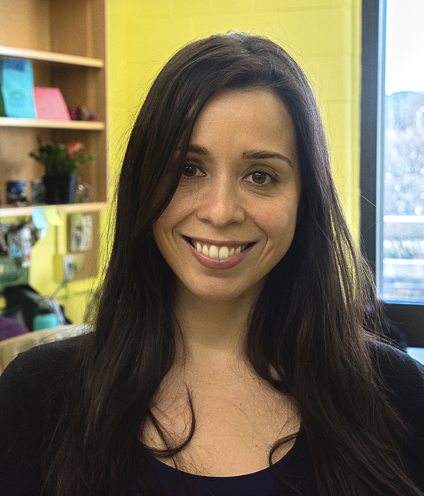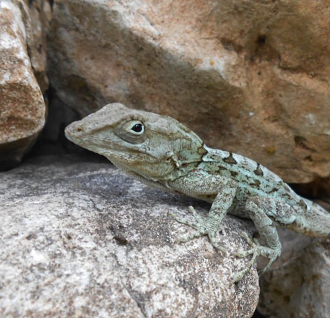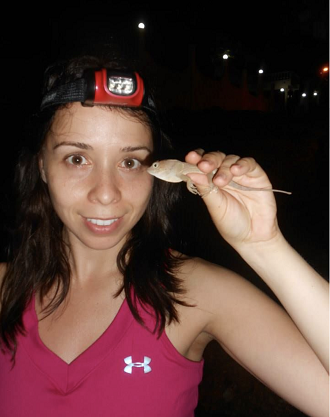 Dr. Martha Muñoz
Dr. Martha Muñoz
Assistant ProfessorDepartment of Biological Sciences
Virginia Tech
https://www.munozlab.biol.vt.edu
Twitter: @Marmmunoz, @MunozLabVT
Start date: August 2017
PhD: Department of Organismic and Evolutionary Biology, Harvard university; advisor: Dr. Jonathan Losos
Postdoc: Division of Ecology and Evolution, The Australian National University; advisor: Dr. Craig Moritz
Postdoc: Department of Biology, Duke University; advisor: Dr. Sheila Patek
About the department:
What drew me most to Virginia Tech was the collegiality and sense of community in the Department. The Department puts special emphasis on helping junior faculty, and I feel very supported. Additionally, the academic community was very appealing. We have paleontologists, ecologists, and evolutionary biologists of various backgrounds, leading to a rich and intellectually diverse community of peers. Living in the Appalachian Mountains is also a huge plus!
About the research program:
My primary goal is to answer one of the most enduring puzzles in evolutionary biology: Why does evolution proceed unequally? The uneven tempo of phenotypic evolution is a universal feature of biological systems, leading some features and lineages to be highly diverse and others almost unchanged over millions of years. I seek to discover the motors and brakes underlying diversification, and reveal their footprints across distinct phylogenetic scales. I lead an integrative program, and weave together behavioral ecology, physiology, biomechanics, environmental modeling, and comparative methods. This range of approaches and systems, however, are all firmly rooted in revealing the key pacemakers for evolution.
What has been the biggest challenge as a new PI so far?
Building my research program has been an exciting challenge! In addition to my research on lizards, I am expanding the lab to study evolutionary physiology and ecology of Appalachian salamanders. Establishing a new line of research has been challenging, but I am definitely thrilled to add a new study system to the lab’s research program. Additionally, I’m starting new collaborations for studies of evolutionary biomechanics, and getting projects off the ground requires dedication and hard work. It’s all incredibly rewarding, though, and completely worth it.
What has been the biggest surprise so far about being a new PI?
Before becoming a faculty member, I did not realize how many new responsibilities I would take on. In some regards, this was a bit overwhelming because many of these challenges – like mentoring grad students and teaching a large undergraduate class – were entirely new to me. But, with new challenges comes a new opportunity to grow. I’ve found the challenge to be very exciting and rewarding.
Do you have a funny story to share from an Evolution meeting?
My roommate from the first Evolution meeting I attended turned out to be a former National Spelling Bee champ!
When was your first Evolution Meeting, and how did it affect your career?
I attended my first Evolution meeting in 2006, while I was an undergraduate at Boston University. At that point in my career, I knew that I wanted to become a scientist, but I wasn’t really sure how to accomplish that goal. Luckily, I had an amazing mentor (Dr. Paul Barber), who encouraged me to present the research I had conducted in his lab at the Evolution meeting. I attended the 2006 meeting in Stony Brook, NY and experienced a professional conference for the first time. The experience was transformative! I was completely immersed in scientific talks and meeting actual scientists, many of whom were my age. I felt like I had discovered my community. I should also mention that I attended that meeting under the auspices of an undergraduate grant through Dr. Scott Edward’s diversity program. That made the meeting affordable for me, and also made me feel very welcomed.
Do you remember your first publication in Evolution or Evolution Letters?
Of course I remember my first publication in Evolution, as it’s one of my favorite papers! I had been studying the evolutionary physiology of rainforest skinks from Australia with Dr. Craig Moritz and other colleagues down under. The skinks in question come from the Australian Wet Tropics, a tiny little sliver of land that harbors a disproportionate number of the continent’s biodiversity. What was remarkable was that closely related skink species differed dramatically in their heat tolerance, with some species being substantially more heat tolerant than others. Even more remarkably, these different types of thermal specialists are found in sympatry. How can two species with divergent physiologies co-exist in the same habitat? They do so by behaviorally partitioning the habitat. When it’s sunny out, only the heat tolerant species are out. When it gets cloudy, the more cool adapted species emerge. Shifts to “basking” or “shade seeking” behaviors occurred many times throughout their evolutionary history, and every shift was predictably accompanied by a change in heat tolerance.
Do you teach evolution? What concept blows students’ minds?
I just taught my first undergraduate course in Evolution this past spring. Every little bit of this class was a total blast. Two topics really stand out as mind blowing for the students. The first is the fossil record. Most of them hadn’t ever really learned about the incredible stories we’ve uncovered from rocks. I can remember their faces lighting up when they learned that whales evolved from cursorial artiodactyls or about Tiktaalik and the evolution of tetrapods. Another topic that really blew their minds was evo-devo, about how incredible biological complexity can actually derive from very simple changes to Hox genes.
I chose to study evolution because it triggers my wonder reflex. I love that I get to share my enthusiasm for evolution with students, and that I get to experience their surprise and excitement. I still share the same wonderment as my undergraduates.
Do you have a time management tip to share?
This may sound strange, but what has worked best for my time management skills has been to work on achieving better work-life balance. By carving out personal time for all the other things I like to do with my life, I have become better at maximizing my time when I am working. In other words, making room for balance in my life has helped me become more efficient when I am working. Then, when big deadlines or other major events require a bit more of my time, I am better able to handle it. I learned this technique while I was a postdoc in Dr. Sheila Patek’s lab. She really supported work-life balance, and part of that included being as focused and efficient as possible while at work.
What one piece of advice would you give to a starting graduate student?
This is going to perhaps sound like odd advice, but I would tell them to get comfortable with “failure”. By this I mean that grad school involves learning and growing and trial and error. Things not quite working out is simply part of the process. I spent a lot of time in grad school too worried about “failing” that I ended up getting stressed and too afraid to think big or take big risks. I eventually found my stride, but it took a lot of learning, stumbling and experience. I see this now in many graduate students. There is so much pressure to “succeed” that it’s easy to get wrapped up in never having anything fail. Grad school is about learning to ask good questions and how to pursue those questions. All of us “fail” along the way – it’s part of learning. Things got easier for me when I got more confident in my own abilities and more comfortable with how scientific research goes.
One more piece of advice (and this one is important): Be kind to each other. Academia and grad school can be tough environments. We deal with lots of rejection and with competitive funding and publishing environments. It’s much easier when we support each other and treat each other with understanding and kindness. My happiest times in grad school were always when I was surrounded by support, friendship, and kindness. Not surprisingly, I also did my best work under those circumstances.
What one piece of advice would you give to a postdoc?
If you’re interested in getting a tenure track job, talk a lot to people who have just succeeded at that task. I spoke often with colleagues, and looked at their application materials to get a broader understanding of what got folks employed. From my experience on the job market, I would say that having the confidence to self-advocate helped me a lot. But, everyone’s experience is different, and learning as much as you can is helpful.
How was your first faculty meeting?
My first faculty meeting was surprisingly uneventful! For some reason, I had pictured in my mind that faculty meetings involved intense debate over departmental issues. That is not the case.
Did you ever have something go wrong in a talk?
Yes! Horribly wrong. I was giving a talk at the annual meeting for the Society for Integrative and Comparative Biology when I was a first-year graduate student and, halfway through my talk, I realized that some of the photos in my slides had been randomly replaced with other photos from the same album on my computer. What was supposed to be a photo of a lush rainforest was transformed into a photo of my colleague holding a vine snake. It turned out that the same colleague was in the audience, and everyone started laughing. And that’s when I learned to double and triple check file uploads before giving a talk!
What is something most people don’t know about you?
One thing most people don’t know is that I am a huge Mets fan. Most of those who do know have given me endless grief about it, including my PhD advisor who for some reason prefers the Cardinals.
What do you enjoy doing in your free time?
I recently became an aunt for the first time. Spending time with my lovely little niece is a huge part of my life. Here in Blacksburg, I participate in a game night with some of my colleagues, which has been loads of fun. Beyond that, I love to go hiking and am learning to play the fiddle (poorly).
 Dr. Martha Muñoz
Dr. Martha Muñoz
